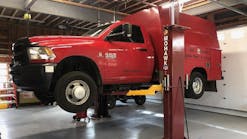Guest Blog: What is a truck tracker?
GPS tracking technology is gaining traction among carriers and owner-operators. Besides the safety and cost-savings benefits, electronic logging laws in the U.S. and Canada have made the truck tracker an essential part of fleet management operations.
What is a truck tracker?
A truck tracker is an IoT device that allows a fleet to monitor the vital signs of an asset such as location, speed, idling, engine and battery health, plus driving trends. These small telematics devices, also sometimes referred to as black boxes, plug into the OBD-II port of a vehicle or can be connected with a harness if needed.
As devices have evolved, newer hardware can include such things as a gyroscope, auto-calibrating accelerometer, and GNSS receivers and be connected to additional fleet tools like dash cameras, video, temperature tracking, or other sensors.
The original truck trackers were not connected to the internet and required a key to download the information. Telematics devices today connect to the cellular network for real-time updates.
Truck tracking software
Truck tracking devices work in tandem with fleet management software. A fleet manager, safety officer, or even a maintenance manager can monitor and report on vehicle or driving trends from this fleet dashboard.
What type of vehicles can be tracked?
A wide variety of assets can be equipped with truck trackers, including delivery trucks, refrigerated trucks, waste and recycling haulers, and pick up trucks. Ruggedized trackers like Go Rugged, which are designed to withstand dust, contact, or water, are better for off-road vehicles, heavy equipment, and powered trailers operating in harsh environments.
For moveable assets such as tools, equipment, or generators, there is another type of solution available.
What do truck trackers do?
In addition to helping track the location of a vehicle, truck trackers plus a telematics platform help fleets:
- Increase productivity
- Improve fuel efficiency
- Operate more safely
- Strength regulatory compliance
- Find better, faster routes
- Increase uptime
- Support customer service
Let’s look a little more closely at some of these.
Route optimization
Some routing planning does not include any traffic models when calculating how long it will take to get from point A to point B. Some truck trackers have add-ins that can give detailed information about traffic at various times of the day and days of the week and also indicate the direction of traffic movement. Having information on traffic patterns and bottlenecks can help the fleet find better, faster routes for its drivers which increases productivity.
Fuel efficiency
Even with today’s relatively low fuel costs, fuel is still a significant expense for fleets so managing fuel is critical. Fuel reports summarize fuel used and distance traveled and provide fuel economy numbers.
The North American Council for Freight Efficiency’s Run on Less, fuel economy roadshow, demonstrated that 10.1 MPGs is possible in the real world of freight hauling, which is significantly higher than the industry average of 6.47 MPG. Idle percentage, fuel trends, out of route miles and average fuel economy can all be monitored and if numbers are not in the expected range fleets can take action to identify the cause — either driver or maintenance — and then correct the problem and get a fleet closer to that 10.1 MPG mark.
Keeping trucks in good condition
Proper maintenance keeps trucks operating at peak efficiency. As we all know, healthier vehicles are more productive. Tracking PM compliance is a good first step in an effective maintenance program. A truck tracker system that also allows a fleet to monitor PM compliance and receive reminders about upcoming needed PM service leads to a healthier fleet.
Today fleets are trying to shift away from preventive maintenance to more of a predictive maintenance model. However, it is important to remember that predictive maintenance is not a replacement for preventive maintenance but rather a way to perform maintenance when conditions indicate an impending problem in order to avoid a breakdown.
Driver safety
Open platform telematics allows for more integration of applications that aid in advanced data capture and enhance fleet safety and overall fleet operations.
Some truck tracking telematics offer in-vehicle driver coaching, driver behavior reports, collision notifications, and reconstruction. Because truck trackers allow the fleet to see where the vehicle is, the fleet can also quickly discover when the asset is somewhere it does not belong either as a result of unauthorized use or because it was stolen. Truck tracking can aid in the recovery of a stolen asset.
Electronic logging
Electronic logging devices can be integrated with truck tracking telematics to assist with regulatory compliance concerning Hours of Service, IFTA reporting and DOT inspections.
Conclusion
Whether you are a large or small fleet or even an owner-operator, truck tracking provides many benefits.
Information provided by Geotab


